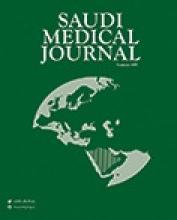SYSTEMATIC REVIEW
Mapping COVID-19 related research from Saudi Arabia, a scoping review. Between reality and dreams
Almaghlouth et al, investigate a total of 53 articles. Most of the research production from Saudi Arabia was opinion and narrative reviews related to the clinicopathological features of COVID-19 as well as control and prevention of virus spread. They followed the Arksey and O’Malley (2005) framework. Medline and Cochrane databases were searched with a focus on identifying articles related to COVID-19 and Saudi Arabia following the PRISMA protocol. The study was conducted at King Saud University, Riyadh, Saudi Arabia between March and May 2020 to map a research production by Saudi-affiliated investigators in order to identify areas of strength and weakness.
see page 791
ORIGINAL ARTICLES
Epilepsy trigger factors in Saudi Arabia. A missing part of the puzzle
Alshamrani et al identify sleep deprivation as the most reported trigger factor for seizures in the Kingdom of Saudi Arabia (KSA), followed by stress, followed by missed medication. A total of 546 Saudi patients with epilepsy participated in the study, of which 289 (53%) were women. Of them, 263 (48.1%) had no seizure in the previous 3 months. One hundred and thirty-six (25%) had a family member with epilepsy. The most-reported trigger factor was sleep deprivation reported by 285, followed by stress, missed medication, anxiety, and fatigue. This is part of a cross-sectional study carried out in 2020 in a Saudi population in the KSA. We used an online questionnaire to evaluate the most common seizure trigger factors.
The basic seizure classification
see page 828
Increased expressions of cellular ATP-binding cassette transporters may be a promising diagnostic marker for colorectal cancer
Qutub et al conclude that the expressions of ATP-binding casette transporters were found to be significantly higher in colorectal cancer (CRC) patients, and they may act as diagnostic markers and should potentially be tested for their contribution to drug sensitivity in CRC patients. The results showed that the 3 ABC transporters, particularly ABCC1 (p<0.0001), were highly expressed in the blood of CRC patients compared with controls. However, none of the 3 transporters was related to the progression of CRC, age, gender, or body mass index. In this case-control study, the messenger ribonucleic acids were isolated from the blood of 62 CRC patients who were recruited from King Abdulaziz University Hospital Oncology Clinic and 46 controls from King Fahad General Hospital Blood Bank (Jeddah, Saudi Arabia) from September 2016 to March 2017.
Expression levels of mRNA for ABC transporters
ssee page 834
CASE REPORT
Endoscopic dilatation as a new technique in managing pediatric duodenal hematoma
Alharbi et al present a case of a post-traumatic duodenal hematoma after a road traffic accident in a 10-year-old boy with progressive vomiting 3 weeks after the accident. The case was managed using serial esophagogastroduodenoscopy (EGD) with dilatation. Controlled radial expansion (CRE) balloon dilatation was performed 4 times over a period. The patient recovered uneventfully and remained asymptomatic at the 3-month follow-up after the last endoscopic dilatation. This case highlights the applicability of EGD with CRE balloon dilatation as an alternative to surgical treatment in patients with symptomatic post-traumatic duodenal hematomas.
First esophagogastroduodenoscopy pre-dilatation image showing the stenosis of the duodenal lumen (arrow)
see page 874
- Copyright: © Saudi Medical Journal
This is an open-access article distributed under the terms of the Creative Commons Attribution-Noncommercial-Share Alike 3.0 Unported, which permits unrestricted use, distribution, and reproduction in any medium, provided the original work is properly cited.









